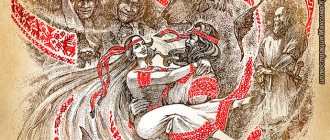The territory of Africa is inhabited by thousands of tribes. Each of them is unique in its own way and has distinctive features. This applies to both ordinary life and holidays. In African culture, as in any other, great attention is paid to weddings. After all, creating a family is not just a marriage between a guy and a girl, it is a prerequisite for procreation. African weddings are full of amazing customs and rituals. Some of them can easily claim the title of the most unusual wedding traditions in the world.
The wedding portal Svadbaholik.ru introduces you to distant and mysterious Africa. Our article contains unique wedding rituals of the tribes of this continent, as well as interesting facts about brides and their outfits.
Where is the best place to note?

This is how they most often prefer to hold a wedding in: Egypt, South Africa, Tanzania, Kenya, Tunisia, Morocco. The exception is Zambia, which is located inland and boasts the stunning Victoria Falls. The island of Madagascar is the most beloved destination, it combines first-class scenery, beautiful nature and high-quality service.
South Africa

The country is quite developed, so the luxury and comfort typical of Europe are present here, but the cost is also high.
Interesting! In Russia, a marriage entered into in South Africa is recognized as valid. However, if you were planning only a symbolic ceremony, we recommend reading this article.
The procedure is documented and does not require any expensive, specific documents. It can be held in a church or government institution. A wedding in Africa, in addition to marriage, implies:
- safari;
- ceremonies on the beach;
- boat trips on yachts;
- luxurious estates of aristocratic style;
- national parks, nature reserves with the possibility of excursions and photographs;
- unique architectural masterpieces.
Egypt

It is possible to hold the ceremony on the beach or even in the desert. Some exclusive options allow you to get married underwater. If you are planning a wedding in Africa, the photos from the celebration will turn out to be original.
Kenya
This country is rich in natural landscapes; an incredible number of parks will allow you to see almost all species of animals. It is possible to invite a shaman from a local tribe who will perform his own ceremony (for amateurs). There is an interesting service - a safari wedding, the ceremony will be held among wild animals.

Tunisia
A wedding in the country is not considered legal, and Russians cannot officially officiate a wedding, but this is not a problem, since you can get married in Russia, and quickly. There is some cross between European sophistication and African flavor - this is what you need for a wedding.
Wedding traditions among African tribes
Tribal weddings in Africa last at least a week. Therefore, all guests invited to the celebration gain strength, because they will have to dance “till they drop” for seven whole days. This event is also an excellent occasion for bridesmaids to show off their luxurious outfits in order to please the groom's friends and, perhaps, get married soon too.
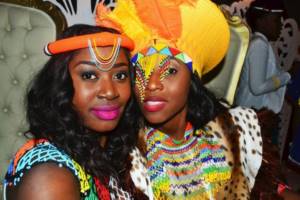
If the bride's friends strive to choose the most beautiful clothes, then what can we say about the future wife. African wedding dresses are distinguished by their special chic: the more colorful and bright they are, the more decor they have, the more beautiful the bride is considered. Moreover, during all the days of the celebration she must change several outfits, as well as constantly change jewelry. A large number of jewelry on the hands, neck and feet of the newlywed indicates her wealth.
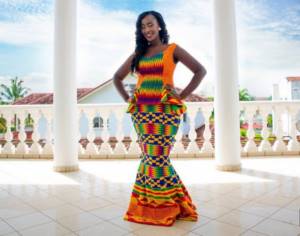
African wedding traditions involve constant “musical accompaniment” throughout the celebration: both day and night. The sounds of tom-toms are not intended to entertain guests or accompany dances, but to scare away evil spirits.
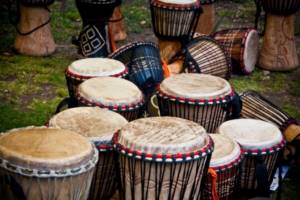
Each tribe has its own wedding ceremony. For example, among the Samburu people, newlyweds walk through a crowd of relatives who spit at the newlyweds. This symbolizes getting rid of failures and material well-being. Before a wedding, the Zulus customarily pour hundreds of liters of beer directly onto the ground so that departed ancestors can also join in the celebration.
At a ceremony in the Bororo tribe, the bride must eat the paired entrails of a bull, and the groom must eat its testicles. This should help the couple have many children.
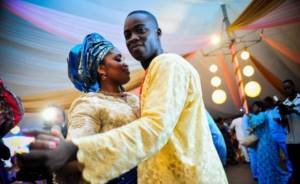
Interesting traditions and customs
Naturally, today Africa lives according to civilized laws and has fairly natural morals, but this was not always the case. Most people go to the continent for exoticism and unusual sensations, so a wedding can be carried out through the traditions of the indigenous people, that is, tribes.
There are a large number of tribes that to this day avoid civilization. It is not necessary to go directly to them, you can simply organize a similar style that is pleasant for the newlyweds. If you are planning a wedding in Africa, the traditions and customs of these peoples must be respected.
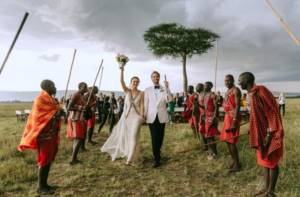
And here are some of them.
- Ransom. Since life in Africa largely consisted of subsistence farming, the ransom often meant not money, but various household items. The type of gift varies depending on the tribe: animals, clothes, kitchen utensils, weapons, food, etc.;
- Dancing. Surely everyone has seen unusual and incredibly long dances that seem to never end at all. At weddings, guests can really dance all day long;
- Victims. The practice is much less common, but there are tribes where animals are still killed as a way of honoring ancestors or to add solemnity to the situation.
There are many other traditions, but their choice can be made independently, based on the choice of country and the number of company services. Includes an original and unforgettable wedding in Africa and the customs of the people of ancient tribes. An experienced photographer will capture the best moments of the celebration.
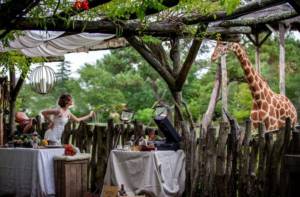
In most countries there are Orthodox churches, even if the states profess Islam. Therefore, the procedure will not be different. Exotic options depend directly on the preferences of the bride and groom.
African wedding: matchmaking and engagement among different nations
There is not a single tribe where it is customary to announce one’s desire to get married publicly, to organize loud matchmaking and a magnificent engagement. Each tribe has its own traditions, but some of them are common to most people in Central Africa. Let's take a closer look at them.
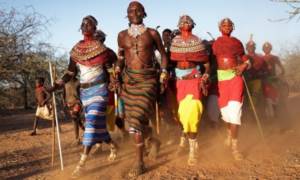
Bride fee
If in the CIS countries the ransom is more of a theatrical performance for guests, which, moreover, is morally outdated, then in Africa the groom and his family literally pay the bride’s family. Each head of the family who gives his daughter in marriage determines the amount of the ransom himself. Some grooms can get off easily, while others have to work for years to save the required amount. And it often happens that by the time of the wedding, the potential bride has either already married someone else or has grown old.
Some African tribes have an interesting custom: there is the possibility of “loans” if the future son-in-law is promising. The groom gives part of the ransom before the wedding, and after the ceremony he pays the rest for several years. By the way, they don’t necessarily pay in money; fabrics and clothes, jewelry, and livestock are also suitable.
Interesting fact: in the Massai tribe, a groom can literally win a waiver from paying the ransom if he wins a high jump competition.

If the potential husband does not have the opportunity to earn a ransom, he will have to come to terms with the idea that his beloved will not become his wife. Such a radical way out of a situation as bride kidnapping is very rare among African tribes, as it is strictly punishable. The girl's relatives can take very cruel revenge on the risky groom.
Bride's wedding
Not only future husbands must prove their worth. Brides must also confirm the fact of their beauty, ability to care for a man and manage everyday life. From childhood, girls are taught to take care of themselves and take care of their face, hair and body. And by the age of 15, girls usually become wives.
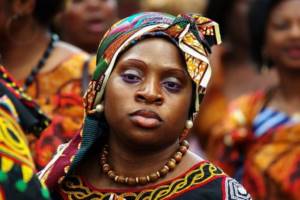
Engagement
As for the betrothal, the scenario here is standard for most tribes that have approached “civilization.” The groom and his relatives come to the house of the bride’s parents, meet or communicate with them, and also give the future wife a ring as confirmation of the seriousness of their intentions.
Features of the event
Holding a wedding in South Africa and the preparation process directly depends on the type of ceremony chosen. There are quite unique wedding processes, or you can have a traditional celebration and just enjoy your honeymoon.
Beach option
This is one of the most beautiful ceremonies, a good idea for people of any income level. Payments for expensive churches or restaurants are excluded; newlyweds are required to submit an application on time and pay the state fee. Here it is important to choose the right place, season, angle, and also choose additional accessories. If there are a large number of guests, you will have to take additional care of decorating chairs and benches.

Safari
The procedure itself can be carried out directly during the safari, it is possible to exchange vows in the presence of animals. Independent planning of such a wedding is unacceptable, since a specially designated place and conditions of a sufficient level of security are required. This procedure is by default more expensive, but it is exotic, and the photo session will be very unusual; you won’t have to go far to get stunning photos.
Underwater wedding
A wedding in South Africa is one of the most expensive. Here you will have to trust the professionals, since you will not be able to find and prepare the area yourself, as well as take care of the safety of the procedure. Usually you need to hire a yacht that will take you to the most beautiful reefs; an experienced captain will take you to a place where fish accumulate for a photo shoot.

Images of the bride and groom
Several basic mythical as well as more real scenes are predominantly used.
King and Queen
Usually the foundation is based on the famous King Tutankhamun or Queen Cleopatra. The newlyweds and guests dress in traditional ancient outfits, which allow them to recreate the grandeur and extraordinary spirit of the ancient world. There are several main trends here, some prefer to wear practically no clothes, while others, on the contrary, use a lot of fabrics.
It is popular to use the skin of wild animals, necklaces made of beads or teeth, and the claws of prey. When a wedding is held in Africa, body painting traditions are in great demand among newlyweds. The result is incredibly beautiful and colorful ceremonies.
Tribal images
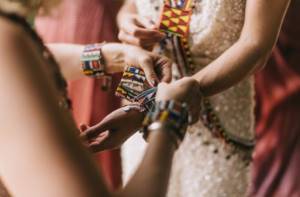
The traditions of individual tribes are often used. The most popular traditions are Zulu, Maasai, and Mursi. In most cases today, their morals are peaceful and differ only in culture: unusual outfits, understanding of nature, worship of deities.
Such weddings are stunning in their originality; on the one hand, they are outlandish, they revive primitive passion, and are very intriguing. On the other hand, the lack of comfort, as well as the striking difference in cultures, will not please everyone.
Gods' outfits
The gods have always been given special importance in Africa. Using images of deities is a great idea for an unforgettable ceremony.
The Golden Fleece
According to some myths, it is located in Africa; this can be successfully used to create the image of Jason (who went in search of Rune) and Medea (his beloved).
Marine theme

This option is used somewhat less frequently due to the complexity of their implementation, but they often resort to the image of Poseidon, the Mermaid or pirates. The reason is the need to arrange an underwater accompaniment. If you carry them out on land, the colorfulness will be somewhat lost, but implementation is easier.
African wedding traditions
Africa is a continent inhabited by more than a thousand tribes, each with its own culture, colorful and original, its own traditions, which sometimes represent a mixture of ancient African, Christian, Muslim, Jewish, and Hindu customs.
Naturally, wedding rituals are different, but still determine the general concept of the family. It is associated with the unification of a clan or tribe. They say that there are practically no divorces there: family problems are solved by the entire tribe, trying to find a way out of difficult situations. Family values come first! There really is a lot to learn!
Girls are prepared for marriage from an early age. And marriages themselves take place quite early - usually at the age of 13-15 years.
Wedding in Namibia
Namibia is located in the southwestern part of the African continent. Here they focus on holding lavish wedding celebrations - at least 100 people invited, the average number of guests is about 500 people.
The articles write that European printing is a luxurious exotic in Namibia, so a standard European card with wedding symbols is a valuable wedding invitation card, which not all newlyweds can afford.
Local artisans come to the rescue: they make invitations in a handicraft way, making colorful pictures from dry leaves and colored paper. The wedding is celebrated for 2 days, and the marriage is registered at the local city hall.
Of particular interest is the bride's traditional headdress - ekori. It is made from goatskin, which is specially rubbed with a mixture of red ocher, resin and fat until it acquires a brown tint.
However, European customs had a significant influence on African peoples, so modern Nabi brides do not neglect the traditional white wedding dress.
Wedding of the Surma tribe (Ethiopia)
The wedding traditions of the Surma tribe from Ethiopia do not leave Europeans indifferent, especially what the women of this tribe do with their appearance! Six months before the wedding, the girl’s lower lip is pierced in order to insert a clay disc-plate into it. The discs become heavier at certain intervals, and in order not to interfere with the position of the plate, the 2 lower teeth are removed. The lip plate can reach a diameter of 30 cm. The larger the disc, the richer the bride's dowry!
Also in the religion of these tribes it is believed that evil spirits find their way to the body through the mouth, and the disk protects the girl from misfortune. There is another legend: they say that such a “decoration” saved a girl from slave traders - it’s unlikely that anyone would like such a beauty as a worker. A girl can remove the labial disc only at night, while eating, or when there are no men nearby.
And this is the groom!
Wedding in Kenya.
In Kenya, a special place is given to the bride's wedding decoration. This takes several days, so the future bride needs to be patient. An intricate henna pattern is applied to the bride's hands and feet. The bride's entire body is rubbed with coconut and sandalwood oil, and body hair is completely removed. The drawings on the young wife’s body do not wash off during the first year and mean that the girl has acquired the status of a married woman.
After the wedding, the husband is ordered to wear women's clothes during the honeymoon to experience the hardships of women's worries. It is believed that this will contribute to the husband’s tolerant attitude towards his wife’s household responsibilities.
Costs and expenses
The budget of the event depends on the main and secondary expenses.
- There is always a constant component - the flight, it depends on the country and the number of transfers. The number of guests must be taken into account; it is possible to pay for the flight of relatives.
- Accommodation in rooms, some countries are famous for resorts around the world, for example, Tanzania, so the cost of living there is more expensive, you can give preference to less popular destinations.
- Payment of the state fee for the ceremony.
- Cost of the venue, the beach is free, only decor is paid.
- Food, as well as cafes, restaurants or other events.
- The constant component is the photographer.
- Cost of agency services for organization.
Script ideas

Africa, even without additional embellishments, is an interesting and quirky continent, home to a wide variety of cultures. To recreate an unforgettable photo shoot with unique landscapes or costumes, additional ideas can be used, for example:
- the ocean beach is a timeless classic, it will never go out of style, as it has a breathtaking landscape: it is especially beautiful to hold a ceremony at sunset;
- holding a wedding in a cafe, which is located right in the safari zone, when wild animals surround you on all sides: after the marriage you can go and enjoy unity with nature;
- staging unique costume scenes: often based on ancient myths and love stories that arose between ordinary residents or the king and queen;
- in skits, a chain of tasks can be used, after overcoming which the bride and groom become united: it’s great if you can make a skit near the ruins of ancient cities, perhaps pyramids;
- wedding in the air: a flight in a hot air balloon can be an unforgettable adventure, and stunning landscapes will become an excellent backdrop for romantic photos;
- holding a wedding on the water in a traditional tribal boat.
My big African wedding (photos and videos)
Hi all! My name is Yana, I have a fully grown daughter and, more recently, a husband. I live in Moscow, but today's post is not about Moscow day. Today I want to show you February 22 - the day we had our second wedding. The first was in Moscow, at the registry office, as expected. And the second was in my husband’s homeland, in Cameroon.
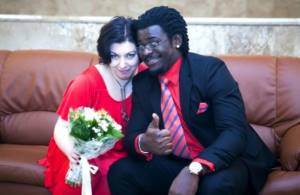
Further…
1.so, we are in a small (150 thousand inhabitants) town called Kumba in the English part of Cameroon. I wake up and see the pink walls of the Vianello hotel room. The air conditioner worked almost without interruption, the electricity was cut off only briefly at night, so you can breathe - what a blessing!

2. I wake up alone in the room - my husband ran early in the morning to supervise the preparations for the wedding, he cannot sleep on such a day. and I am, firstly, a creepy owl, and secondly, what the hell, I have a honeymoon. thirdly, he, of course, woke me up at seven o’clock... after which he went about his business, and I fell asleep again. In short, now it’s already half past twelve - it’s time!

3. creepy morning crossbow in the mirror. Well, excuse me, I’m for the truth of life!

4. The key turns in the lock - Moki arrived, all lathered - it’s 35 degrees outside, as usual. For some reason, my African can handle the heat even worse than me. This is probably why, among other things, he left here. about five days before our return he began to whine “I wanna go home, I want to see snow and feel cold!”

5. We get off at the hotel. and take pictures with the local guards and doormen - two creepy-looking lions with a brutal grin. I really like them. Yes, it’s better to take children away from screens for a minute.

6. In the hotel lobby we meet Moki’s sister Glenn and her husband Erneste. they live in Nigeria, they arrived just the day before to attend our wedding and the next day to throw a party in honor of their newborn son.

7. We need to go to the dressmaker to try on the wedding dress. my newly acquired mother-in-law and her eldest daughter ordered it without me, based on the description of the moka. so some things may need to be adjusted. I have no idea what kind of dress it will be. the color, the style, and the length - everything is a surprise. however, like this whole wedding. In general, in Kumba, as in Cameroon in general, people travel mainly on bikes. There is also a yellow taxi, which can hold 5-6 people. public transport as such does not exist, at least in small towns and villages. Personally, I’m terrified of riding bikes. never tried. but here I had to - in the evenings you can’t find a taxi, especially on alleys far from the main street. but today, fortunately, we ignore the bikes and catch a taxi - there are four of us!

8. we have arrived. ordinary street kumbah. The dressmaker was very sweet and silent, she only smiled, and only the mother-in-law spoke. The dress is almost just right, slightly sewn in. It looks, perhaps, like an American cocktail dress from the 80-90s. well, it seemed so to me. funny, in general. On this trip I accept everything that comes, I decided so - so I can’t even really say whether I like it or not. I don’t feel any rejection, which means everything is fine. It was impossible to take pictures there, so I won’t show you the dress yet.

9. and here, by the way, is she - my new maser-in-low. so informal, yeah. Today I see her for the second time in my life, and the first was five days ago.
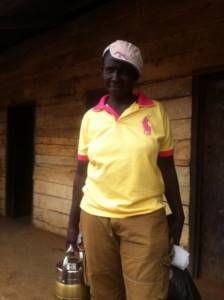
10. Moki met the mother of one of his friends, who also lives in Moscow. I need to stop, chat, tell you how it is in Moscow. In the evening she will, of course, be at the wedding.
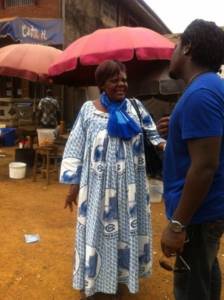
11. We are walking down the street, trying to find a taxi to go back to the hotel, have breakfast or have lunch. we meet a man with goats.

12. Until we found food, we decided to buy nuts from a street vendor. He cleaned them in a completely unique way, I even recorded a video. I just put a handful of roasted peanuts in a bowl, and then started tossing and catching it, tossing and catching it - several times. and as the nuts flew, the husks flew off. it looked like juggling, cool.
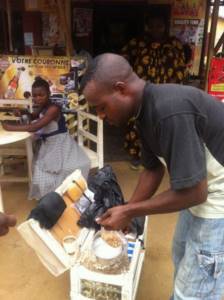
13. and this is the beauty salon next door. in my opinion, wonderful creativity))) by the way, I had a serious problem here: I didn’t take shampoo with me, apparently remembering the European-American hotels that usually have them, naive) we arrived, started looking in stores - and Fuck, they don’t sell shampoo in stores here! It turns out that local women, like decent people, go to salons weekly, where they have their hair washed and styled with a lot of styling. and whoever has a complex African hairstyle is a beauty in general. So I walked around there, dirty, without any styling, a la naturel, with my hair washed with shower gel. Next time I'll be smarter.

14. While we were looking for a taxi, it turned out that we wouldn’t be able to return to the hotel - we needed to go to Moki’s grandmother. A big and unusually important event is coming up: in honor of our wedding, Moki’s mother decided to make peace with her mother, with whom she had not spoken for several years. something there because of property, inheritance, well, as usual. and the newlyweds need the blessing of the oldest family member, so they will have to put up with it. in the face of family and other comrades. Well, since grandma is already over 80, her legs hurt, most likely she will not make it to the wedding, so we will receive the blessing right now. We catch a taxi again - at a cafe called “Charles de Gaulle”.

15. arrived. on the one hand there is mail, on the other there is fast internet.

16. This place is called a family compound - something like a settlement where a large family lives in a common household: cousins, uncles and aunts, grandmothers, second cousins, grandchildren and great-grandchildren. In the photo on the left is a restaurant that used to belong to Moki’s mother, she dreams of returning it.
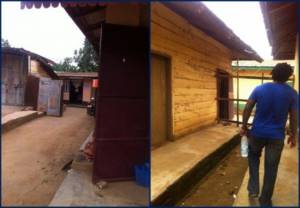
17. The grandson hugs his grandmother. Next to her is the grandmother’s sister, in her arms is the newborn Erneste, the son of her husband’s older sister.
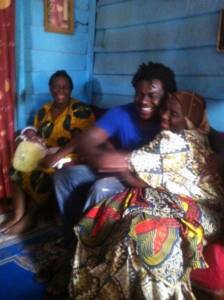
18. Then Anita Mojoko (mother) spoke a long and passionate speech. Elizabeth (grandmother) listened and smiled wisely. then everyone hugged, then they prayed, then they hugged again. mother and daughter reconciled.
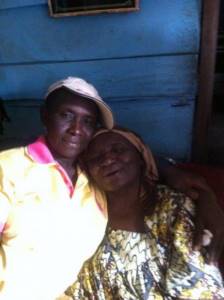
19. Grandma is actually very smart, one feels cunning, ironic. she used to work as a teacher, and, apparently, it is to her that I should be grateful for my husband’s good English. Great-aunt also seems to be on her own, in a good way :)

20. and this is the woman who read the prayer. she seemed to be very devout and active - she prayed loudly, passionately, earnestly. but this, in principle, is not uncommon among the people. I once attended a service in their church in Moscow, and almost everyone present was screaming, laughing, crying, dancing - no one was praying, just quietly and calmly, sitting still. such a temperament.

21. I didn’t take pictures of how grandma blessed us, it was awkward. she said something quietly and poured water and beer (?) on the threshold, which meant something like wishing our family strength and prosperity. In general, instead of a blessing, I filmed my nephew.

22. We left there at about an hour. somehow everything is very fast, if you think about it - I woke up only an hour and a half ago.

23. I periodically remembered (and reminded Moki) that I had not yet had breakfast. the rest woke up early and also got hungry - so we decided to have lunch at a restaurant nearby. waiting for an order. I really like this picture. Moki with his nephew in his arms - and further, in the doorway, an errand boy, apparently the son of the owners, is looking straight at me.

23. In general, by our standards, it’s a bit of a stretch to call this place, like almost all the places I’ve met in Cameroon, a restaurant. no glamor, only hardcore! but they do excellent traditional African food, which most people eat. I wanted to try it too. I allowed him to order moki for me as he saw fit. we are still waiting for the order. Moki's sisters, Karin and Glenn, are twins. but, as you can see, they are not very similar to each other, both in appearance and article, and in character. It was interesting to watch them. and their relationship with my husband. I am the only child in the family, I have always been very curious how sisters and brothers get along.
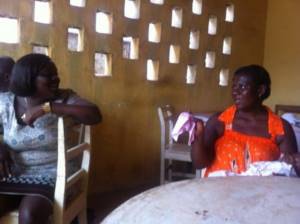
24. They brought food. called achu. They show me how to eat it. I'm not doing very well. and, to be honest, I don't like the taste. I tried, but I still had to admit that no, it’s not mine. everyone laughed at me joyfully and continued to enjoy their achu :))) the waitress with a cool haircut and red forelock is called Branda, she is the daughter of the owners, an old friend of the family.
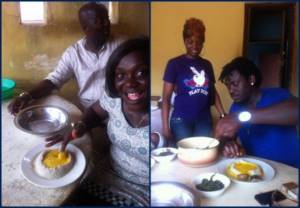
25. and this is Moka’s son, Bruno, he is 14 years old, but looks much older. mainly because it is very large. very nice good guy, helpful and delicate, with a sense of humor. He accepted me so kindly, I was grateful to him.

26. On the way back to the hotel, we stopped for a minute to look at the hall where the wedding will be held. it's already being decorated.
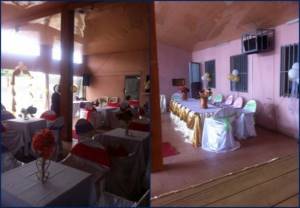
27. arrived at the hotel. by taxi, not by bike - hooray!

28. Now we need to take a break from the exhausting heat, take a shower, and then get ready, put on makeup, and get dressed. The wedding is scheduled for 17.00. The dress should be delivered to me directly to the hotel. moki runs off somewhere again - the latest agreements with the DJ, ms, photographer-operator and speakers. and the bride remains to wait until they come for her. time

29. After the shower I lie around and read a little. For some reason I felt drawn to re-read Madame Bovary here. or rather, not like that - I was drawn to read it, and apart from Flaubert, nothing on the phone inspired me.

30. TV in the background. My favorite “bones” are on air.

31. I finally decide to put on makeup. in this heat, of course, any makeup is suicide. but I’m still a bride, the position obliges me. I only paint my eyes, as always. In short, this is what happened.

32. and time, meanwhile, is already approaching that same thing.

33. The dress has finally arrived! trying on, shooting a cross in the mirror, trying to tie a scarf somehow so that it doesn’t look too funny.

34.

35. in the window - beginning twilight. It gets dark here early and very quickly; before you have time to look back, it’s already completely dark. and many bright stars, very beautiful!

36. I’ve already put on a dress and a scarf, I’m all ready, I’m exhausted. I hate waiting, but for some reason very often life turns out in such a way that you have to wait. Apparently, this is how they teach me patience. well, I'm waiting. I’m watching some funny clips on a local music channel. Moki still doesn't work.

37. He comes when I’m already boiling - it’s 7.20. I tell him: the wedding was supposed to start at five, or did I misunderstand something?? it turns out that, according to tradition, the newlyweds cannot appear at the celebration until all the guests have arrived. in any case, the most important guests, about whom it is known for sure that they will come, did not get sick and did not change their minds.

38. In the meantime, there is time to calmly put on a real men’s brutal… skirt. This is the traditional clothing for the tribe my husband belongs to, called bafaw. the skirt is actually a large piece of black velvet that is wrapped around the waist.

39. family assembled. ready to go! finally!
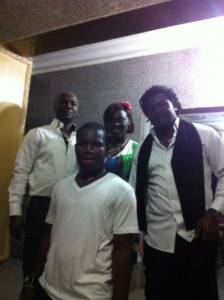
40. In the end, it was already about nine when we appeared in the hall. I didn’t have time to take off my watch (I forgot). About 200 people gathered. Half were sitting in the hall at tables, half - apparently not the most important guests - took chairs in the courtyard. but there was also a buffet with food and drinks. and it was probably more pleasant to dance there - after all, after sunset the air becomes a little fresher. and we suffered terribly from the heat inside; the fans couldn’t cope. Next there will be several photographs taken by a local photographer-operator. yes, he took videos and photos at the same time, I don’t know how he did it.
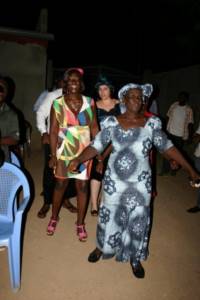
41. So we entered the hall - dancing and shouting joyful cries. the guests also greeted us with shouts, whistles and applause. It suddenly became a lot of fun.
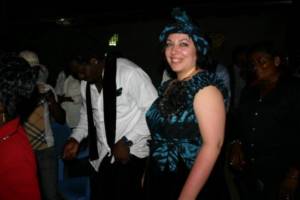
42. In the foreground is the mother-in-law, behind her is the older sister Glenn.
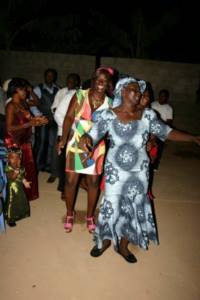

43.

44.
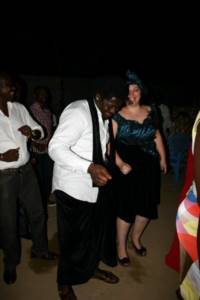
45. yes, and I was the only white person at this wedding. Moki was the first in his family to marry someone other than black.

46. We finally danced to our table. Let's sit down.
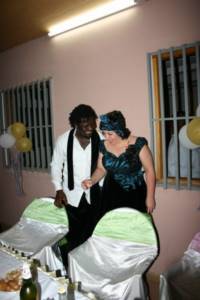
47. mother and older daughters. Karin is beautiful in a red dress.
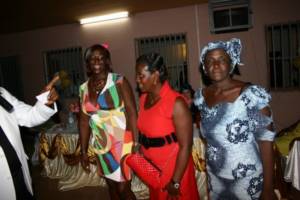
48. Sitting at our table are the oldest family members on the father’s side, on the left hand, on the mother’s side. plus on the edge - Glenn and her husband. I don’t know why this is so, apparently, the older sister and her husband are also like an elder. Mom was sitting at another table, somewhere behind.

49. We are cutting the cake. more precisely, we are trying to hear and understand the instructions on how to cut it.
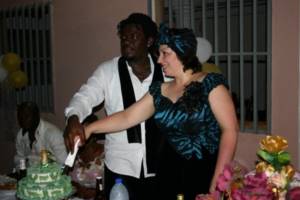
50. In general, everything is like at a normal Soviet wedding. I had to first show how my husband would take care of me (feeding me wedding cake mouth to mouth)…
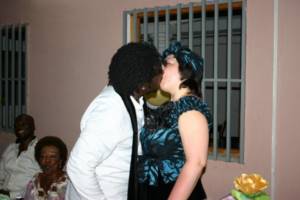
51. ...and then - how I, in turn, will take care of him (feed him wedding cake from my white chest).
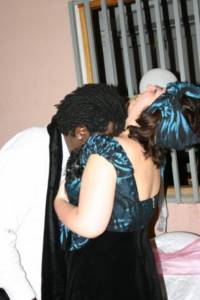
52. By the way, we didn’t really eat the cake - we didn’t wait until dessert, and then relatives took it somewhere and ate it. I don't even remember its taste :)
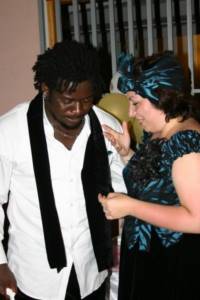
53. and this is already, like, a buffet table. All the food was prepared by friends and relatives of Mokina’s mother the night before and at night, such a tradition. right in the yard, on fires built for this purpose (they have small tiles in their houses, but it is impossible to use them during the day or indoors - they can melt). food is traditional.

54. Moki, who already knows my tastes and preferences, gives recommendations on what to take and what not to take under any circumstances. as a result, I ate my favorite fried plantains, fried fish, rice with vegetables and spices, vegetables with pistache grains and something else from some other grain, it seems - I can’t make it out and remember the name and composition. but tasty.

55. with sister Karin.

56. And this Bruno ran up once again for the next task. Moka's skirt has no pockets, so my son kept the money and phone. and periodically, when it was necessary to give one of the performers tips or something else, Moki would call Bruno with a click and whisper instructions in his ear.

57. next relatives. on the left in a pink dress is Cousin Emma, a groovy girl! lawyer, by the way. She studied in the capital, now she has her own practice in the kumba. danced amazingly. and her dress was, in my opinion, the most beautiful. By the way, about dresses. Everyone here dresses up both on holidays and on weekdays - whoever suits their needs. today it could be jeans and a t-shirt, and tomorrow it could be a traditional dress called kaba. Somehow they combine it completely harmoniously, both young and old. At the wedding, too, half of the guests were in traditional clothes.

58. part of the traditional ceremony is the giving of gifts. it happens like this: in front of the entire honest public, the bride and groom shift from foot to foot to the music, and guests reach out to them in an “endless line,” like to a mausoleum, also dancing, and presenting their gifts right in the dance. In this photo, one of the many aunties unexpectedly “presents” little Erneste to me. and I seem to show with all my appearance that “it’s been a while since I picked up checkers” - in the sense, I haven’t held babies in my hands.
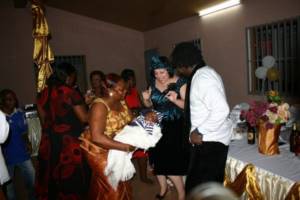
59. and, of course, the obligatory posing with all the guests. In this picture we are with Moki's mother and her brother.
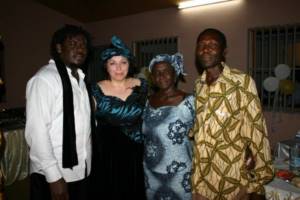
60. and here I am with... I don’t know with whom, I don’t remember them all! well, some not very close relative.

61. Moki took a picture of me with his iPhone - you can see how sweaty and exhausted I am, right? By the way, did I already mention that the only drinks at the wedding were local beer? So, besides beer and water - nothing. I liked it very much. Firstly, in such heat, drinking anything stronger than beer is suicidal. secondly, everyone was cheerful, but there were no drunks. Wonderful!

62. and this is my favorite wedding photo. The bride and groom, stunned by the heat, lifted their skirts and exposed their knees. Well, the friendship of peoples is obvious. I mean, on my knees.

63. Then professional photographs end, because the photographer did not film the dances - or rather, he did, but on video. and I’ll show you just a couple of those crazy blurry photos that I took from my place with my iPhone. I apologize for the quality! but maybe you'll be curious. This moki is a soloist in a traditional men's dance. it's all about the movement of the hands.

64. and this is Moki’s friend having a blast with his mom. in general, everyone dances there, from young to old, regardless of age, weight and social status. and they dance great! I admired it all evening. yes, and by the way, I also had a blast there during my dance with the groom. I had such a blast that my visiting relatives later asked my mother-in-law how many months Moki had been training me. and I was just suddenly inspired by all this, and it was very easy to follow my husband. and he is a wonderful dancer. In general, I surprised myself. this dance was the highlight of the evening and the most memorable moment for both of us.

65. There was also a parodist, a comedian, and a beatboxer in the program, but in the photographs they do not look very expressive, so I decided to sacrifice them. end of the evening. tired mother-in-law.

66. In the end we were so tired that we decided to sneak away, leaving the guests to finish the celebration. The last photo of this day is me and my adopted son Bruno. he said that he was quite pleased with the holiday. I saw him even dance a little with a beautiful girl in a pink dress, although he was very shy.

after that we went to the hotel on a bike (!!!). and there was no electricity in the hotel. I admit, I did take a photograph of the wildly exhausted Moki when he finally took off his velvet skirt and shirt and lay down in a T-shirt and shorts right on the floor to cool down - and he fell asleep, and then I woke him up and shifted him. in general, I took him in such an unflattering position, but then I deleted these photos :) I’m kind after all. I took a shower and suddenly lost all my strength. I fell asleep, forgetting to even take a screenshot from my iPhone over time. you'll have to take my word for it - we returned to the hotel around two in the morning. thank you for living this hot day with me. love to everyone and good luck!
if anyone is interested, here is a video from our Cameroonian wedding, in three parts. in the third part at about 3.35 there is the most beautiful and funniest part, the dance of the bride and groom. funny is me, beautiful is moki. This is the division we have in our family)))
Source
Recommended viewing:
Bullfights, drums and a golden dowry: how to get married in the Comoros
One day in Africa with elephants in Kenya and the Maasai of Kilimanjaro
African holidays
Required documents

To register a marriage, the minimum number of documents required is:
- passports of the newlyweds along with visas, also attach notarized copies;
- birth certificates;
- return air tickets.
In fact, an African wedding is quite expensive, but in order to save a certain amount of money, you can choose the right time. During peak season, room rates increase significantly (May-July). Accordingly, if you choose a different time, the cost will be lower, although even in winter the temperature practically never drops below 18°C. The disadvantage is that the continent may experience rainy season, winds or jellyfish. Additional savings can be achieved by booking air tickets and hotels in advance.
Preparation.
Since the age of newlyweds in Africa rarely exceeds 15 years, their parents negotiate the upcoming wedding. The boy's parents choose a bride for their son using the services of a matchmaker. A woman, attending all kinds of holidays, looks closely at the young ladies, then makes a list of suitable candidates and shows it to her betrothed and his parents.
African girls are prepared for marriage from childhood. They are taught the importance of family and are taught various tricks of housekeeping and everyday life. When entering into marriage, a young lady is well aware of how serious procreation and raising children are.







